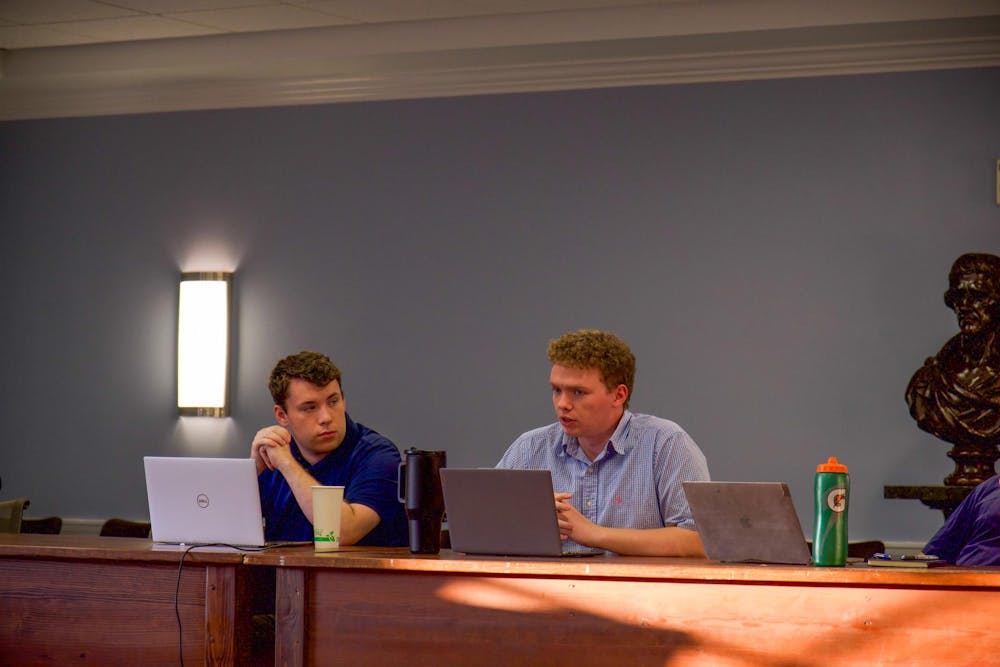The Honor Committee met Sunday to discuss amendment proposals to the Honor bylaws, specifically regarding the guilt admission procedures. The Committee also heard from a University professor about the impact of artificial intelligence on Honor at the University and how to better engage fully remote students in the Honor processes.
The Committee introduced the bylaw change proposal that would amend the Express Admission of Guilt process at last Sunday’s meeting. Seamus Oliver, chair of the policies and procedures subcommittee and fourth-year College student, gave the Committee a short overview of the proposal, and then the floor was opened to questions and concerns regarding the potential amendment.
As the current bylaws stand, at any time prior to their hearing students can admit guilt via a form provided by the Committee. If a student does so, their right to an Honor Hearing is waived, and they are protected from expulsion. The proposed amendment would add another level of review to this process and set a final date at which students can admit guilt, sooner than the current deadline, and still be protected from expulsion.
Jack Wallace, College Representative and third-year College student, proposed the addition of a new clause during the discussion that would prevent students from utilizing expulsion protection measures after undergoing a previous Informed Retraction procedure. The Committee will be drafting and voting on a final proposal in the coming weeks, but did not specify a date when it will be voted on.
The Committee also discussed an increase in the number of co-sponsorship opportunities they have been engaging in with various student organizations at the University. The Committee's co-sponsorship program made some of its funding available for co-sponsoring events, initiatives and activities with various communities on Grounds, with hopes of increasing awareness of the Honor system and fostering relationships between Honor and students.
This semester, the Committee has provided around $34,000 in co-sponsorships for organizations, including the Economics Club, Goat Yoga with the School of Engineering and Applied Sciences and the Student Council Lighting of the Lawn Committee for the upcoming annual event Dec. 5.
Colin Doyle, Economics Club vice president of tutoring and fourth-year College student, was present at the meeting to speak on the impact of co-sponsorship on the Economics Club. Doyle said that funds from the Committee have allowed the club to provide food during their exam tutoring sessions, which has helped them to increase student turnout by over 100 students.
“We [have been] using the money to cater food and allow the students to eat as they're studying. Which, turnout-wise, has been excellent.” Doyle said. “We went from having about 150 to 200 students to getting well over 300 showing up last time, and it's great to see them all come together.”
Another guest present at the meeting was Mark Erath, assistant professor in the School of Continuing and Professional Studies, who provided the Committee suggestions regarding ways to better engage students both on Grounds and students who are fully remote — such as some in the School of Continuing and Professional Studies — in community dialogue about Honor.
“I feel Honor is a brand-defining [feature] of U.Va.,” Erath said. “The more we can do to reinforce [Honor] and champion it in terms of not just awareness but [also] how it changes, [we can improve] our behavior and interactions within the community of trust and beyond.”
Erath also mentioned the impact of the rapid development of AI and its impact on honor at the University. He emphasized the importance of engaging in discourse amongst the University community about how the influence of AI will affect the academic environment and Honor policy at the University. He highlighted the importance of implementing community forums, in-class discussions and potential curriculum enhancements to encourage participation and the discussion of Honor.
“[We should try to] engage in a dialogue about how AI transformation is impacting Honor practically in the future,” Erath said. “I think Honor is uniquely positioned to engage everybody in that [conversation].”
Erath closed his comments by mentioning ideas on how the Committee should expand its outreach to students who are fully remote. He suggested this could be done by further including them in the Honor processes at the University, such as the Honor Scroll signing, and improving access to restorative ethics seminars to fully remote students.
The Committee is scheduled to reconvene Sunday at 7 p.m.
A previous version of this article incorrectly stated the title for Seamus Oliver, chair of the policies and procedures subcommittee and fourth-year College student. It also incorrectly stated the date for the annual Lighting of the Lawn event. The article has been updated to reflect this change.







